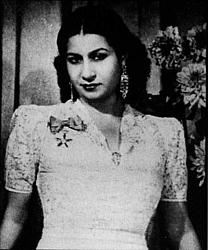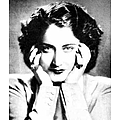Oum Kalthoum Biography
Oum Kalthoum (Arabic: أم كلثوم, other English spellings include: Umm Kulthum, Om Kalthoum, Oum Kalsoum, Oum Kalthum, Omm Kolsoum, Umm Kolthoum, Um Kalthoom) (1904–1975) was an Egyptian singer and musician. Oum Kalthoum was born in Tamay ez-Zahayra village in El Senbellawein, Dakahlia Governorate, Egypt. Her birth date is controversial, either 31 December 1898, 31 December 1904 or 4 May, 1904. She died 3 February, 1975. At a young age, she showed exceptional singing talent. Her father, an Imam, taught her to recite the Qur'an, and she is said to have memorised the entire book. When she was twelve years old, her father disguised her as a young boy and entered her in a small performing troupe that he directed. At the age of sixteen she was noticed by Abol Ela Mohamed, a modestly famous singer, and by the famous oudist Zakariyya Ahmad, who invited her to Cairo. She waited until 1923 before accepting the invitation. She was invited on several occasions to the house of Amin Beh Al Mahdy, who taught her how to play the oud. She developed a very close relationship with Rawyeha Al Mahdy, daughter of Amin, and became her closest friend. Kalthoum even attended Rawheya's daughter's wedding, although she has always tried to avoid public appearances. Amin Al Mahdy introduced her to the cultural circles in Cairo. At this point in her career, she was introduced to the famous poet Ahmad Rami, who wrote 137 songs for her. Rami also introduced her to French literature, which he greatly admired from his studies at the Sorbonne, Paris, and eventually became her chief mentor in Arabic literature and literary analysis. Furthermore, she was introduced to the renowned lute virtuoso and composer Mohamed El Qasabgi. El Qasabgi introduced Kalthoum to the Arabic Theatre Palace, where she would experience her first real public success. In 1932 her fame increased to the point where she embarked upon a large tour of the Middle East, touring such cities as Damascus, Baghdad, Beirut, and Tripoli, Lebanon. By 1948 her fame had come to the attention of Gamal Abdel Nasser, who would later become the president of Egypt. At one point the Egyptian musicians guild of which she became a member (and eventually president) rejected her because she had sung for the then-deposed king, Farouk of Egypt. It was his favour that made the musicians' guild accept her back into the fold. In addition, Kalthoum had been a dedicated Egyptian patriot since the time of King Farouk. Her songs deal mostly with the universal themes of love, longing and loss. A typical concert consisted of the performance of two or three songs over a period of three to six hours. In the late 1960s, due to her age, she began to shorten her performances to two songs over a period of two and a half to three hours. The duration of her songs in performance was not fixed, but varied based on the level of emotional interaction between the singer and her audience. A typical improvisatory technique of hers was to repeat a single phrase or sentence of a song's lyrics over and over, subtly altering the emotive emphasis and intensity each time to bring her audiences into a euphoric and ecstatic state. Thus, while the official recorded length of a song such as "Enta omri" (You Are My Life) is approximately sixty minutes, a live performance could extend to many hours, as the singer and her audience fed off each other's emotional energy. This intense, highly personalised creative relationship was undoubtedly one of the reasons for Kalthoum's tremendous success as an artist. In 1967 Kalthoum was diagnosed with a severe case of nephritis. She gave her last concert at the Palace of the Nile in 1973. Tests at that time indicated that her illness was incurable. She moved to the United States, where she benefited for some time from the advanced medical technology, but in 1975, upon re-entering her home country, she required hospitalisation due to declining health. She died in a Cairo hospital on 3rd February 1975. Her funeral was attended by over four million mourners – one of the largest gatherings in history – and descended into pandemonium when the crowd seized control of her coffin and carried it to a mosque that they considered her favourite, before later releasing the coffin for burial.
Top Oum Kalthoum Lyrics
Write a comment
What do you think about Oum Kalthoum? Let us know in the comments below!
Oum Kalthoum Albums
| Title | Release | ||
|---|---|---|---|
| 1 | Robaeyat Al khayam | ||
| 2 | Best Of Oum Kalthoum |













